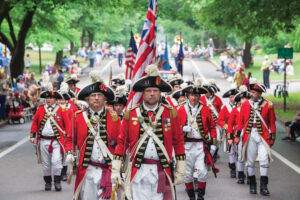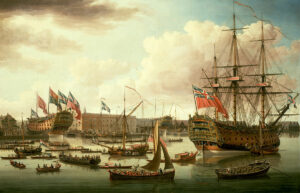Americanism Redux
June 22, your today, on the journey to the American Founding, 250 years ago, in 1773
Filled with them. The pages are filled with them. The people—men, women, children—who are on the run, seeking freedom from some various forms of forced labor. They are enslaved. They are apprenticed. They are bound by contract to one or the other of people who expect forced labor by contract, by birth, by prejudice, by whatever attitude that stand upon a way of life where one person can impose a will upon another without another’s full consent. They are white. They are black. They are of other races and of mixed races. They are men. They are women. They are children. In the pages of the Maryland Gazette you can see their stories if you read between the lines, 250 years ago today and more than appeared a year ago, they are on the run, seeking freedom, seeking liberty, seeking a life that their heart and mind and soul tells them is out there, away from here. One is Sarah, one is Elizabeth, one is Harry, one is William, one is Archibald. Pray for them for they may know you and you may need to know them.
(the newspaper in question)
In a supremely odd combination, this day 250 years ago in the British colony of Rhode Island will combine a celebration and a snubbing. The celebration is a quiet recognition that roughly a year has passed since the British naval ship the Gaspee was seized, burned, and its captain brutalized by local protestors who despised British imperial attempts to enforce trade regulations. Many people in the colony knowingly wink and smile at each other today. At the same time this is also the day that an “official report” has been issued—the imperial investigation into the incident has resulted in no charges, no punishment, no arresting and incarceration of any particular individual or group for the incident with the Gaspee. It is holiday and uselessness together. It is defiance and absence of punishment in tandem.
(a recent ceremony to mark the Gaspee event)
The Spanish friars of the Dominican and Franciscan Orders of the Catholic Church get approval today, 250 years ago, to open their first missions—physical spaces of walls, windows, doors, and roof—to seek Christian converts from among the local native tribes of Baja California, south of the Catholic missions already established in San Diego. The friars are Christian men of the Catholic God, devoting their lives to spreading the teaching and the daily livings of Christianity. The native tribes of the Cochimi, Guaycura, Paipai, and Pericu are the focal points of the friars’ activity. It is an ongoing tension between imposing the religious beliefs founded in Rome and the Vatican on one side, and the natives’ inherent beliefs and outlooks on the other. Neither will dominate, each will contribute, and all will emerge despite resentments, biases, and ill-will.
(the remains of a 1773 mission)
Also
British King George III looks out toward the blue water. What a majestic sight—the white sails high in the air, the brown wooden hulls crashing and slashing through the water, men clad in red and blue and white busy on the decks of the ships. Cannon belch orange fire and black smoke from the sides of the ships. It is a display of the rawest and most impressive of armed power, the key to the British Empire in Europe, Africa, southern Asia, and North America. It is His Majesty’s Royal Navy, the feared and respected military sea power of the Great Britain. The British monarch watches as the ships under his control display their prowess in movement and fire in a special review for the king’s benefit. Just think of it! The living form of British imperial control, boiled down to its clearest essence, sailing in front of the monarch who rules from the throne, 250 years ago, today.
(the naval review as seen by George III)
For You Now
We have people on the run. We have spirituality applied to an end in a particular place. We have one man, a ruler of all others, watching the clearest example of power at his disposal.
One set seeks an answer not currently available but internally knows is possessed and pursuable. One set seeks to press down on another set a way of looking at the world here and the world later. One set—narrowed down to a manifestation in a single human body—relishes an expression of power and armed force that apparently exceeds all rivals on the planet.
When all three sets interact they will unleash a chain of events that no one either foresees or controls. Sparks will fly, igniting fires that don’t yet burn and burning materials not yet in flames.
Suggestion
Take a moment and consider this—which of the three, right now and in today’s terms, seems to you to be smoldering in plain sight.
(the three rivers of Pittsburgh)











